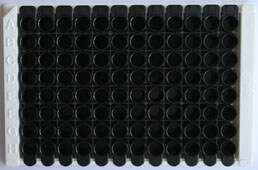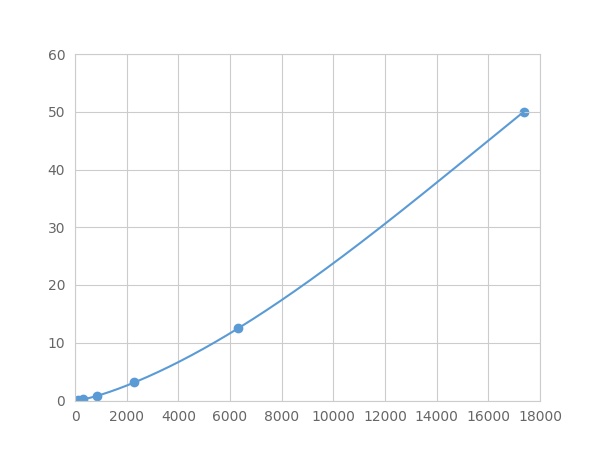Packages (Simulation)

Reagent Preparation

Image (I)
Image (II)
Certificate


Multiplex Assay Kit for Insulin Receptor (INSR) ,etc. by FLIA (Flow Luminescence Immunoassay)
CD220; ISR; HHF5; IR
(Note: Up to 8-plex in one testing reaction)
- Product No.LMA895Ra
- Organism SpeciesRattus norvegicus (Rat) Same name, Different species.
- Sample TypeSerum, plasma, tissue homogenates, cell lysates, cell culture supernates and other biological fluids
- Test MethodDouble-antibody Sandwich
- Assay Length3.5h
- Detection Range0.05-50ng/mL
- SensitivityThe minimum detectable dose of this kit is typically less than 0.017 ng/mL.
- DownloadInstruction Manual
- UOM 8Plex 7Plex 6Plex 5Plex 4Plex 3Plex 2Plex1Plex
- FOB
US$ 427
US$ 443
US$ 468
US$ 501
US$ 534
US$ 583
US$ 657
US$ 821
Add to Price Calculator
Result
For more details, please contact local distributors!
Specificity
This assay has high sensitivity and excellent specificity for detection of Insulin Receptor (INSR) ,etc. by FLIA (Flow Luminescence Immunoassay).
No significant cross-reactivity or interference between Insulin Receptor (INSR) ,etc. by FLIA (Flow Luminescence Immunoassay) and analogues was observed.
Recovery
Matrices listed below were spiked with certain level of recombinant Insulin Receptor (INSR) ,etc. by FLIA (Flow Luminescence Immunoassay) and the recovery rates were calculated by comparing the measured value to the expected amount of Insulin Receptor (INSR) ,etc. by FLIA (Flow Luminescence Immunoassay) in samples.
| Matrix | Recovery range (%) | Average(%) |
| serum(n=5) | 89-96 | 92 |
| EDTA plasma(n=5) | 90-97 | 94 |
| heparin plasma(n=5) | 96-105 | 101 |
Precision
Intra-assay Precision (Precision within an assay): 3 samples with low, middle and high level Insulin Receptor (INSR) ,etc. by FLIA (Flow Luminescence Immunoassay) were tested 20 times on one plate, respectively.
Inter-assay Precision (Precision between assays): 3 samples with low, middle and high level Insulin Receptor (INSR) ,etc. by FLIA (Flow Luminescence Immunoassay) were tested on 3 different plates, 8 replicates in each plate.
CV(%) = SD/meanX100
Intra-Assay: CV<10%
Inter-Assay: CV<12%
Linearity
The linearity of the kit was assayed by testing samples spiked with appropriate concentration of Insulin Receptor (INSR) ,etc. by FLIA (Flow Luminescence Immunoassay) and their serial dilutions. The results were demonstrated by the percentage of calculated concentration to the expected.
| Sample | 1:2 | 1:4 | 1:8 | 1:16 |
| serum(n=5) | 94-101% | 93-101% | 88-101% | 92-101% |
| EDTA plasma(n=5) | 87-98% | 86-93% | 90-98% | 83-104% |
| heparin plasma(n=5) | 87-96% | 78-92% | 89-97% | 98-105% |
Stability
The stability of kit is determined by the loss rate of activity. The loss rate of this kit is less than 5% within the expiration date under appropriate storage condition.
To minimize extra influence on the performance, operation procedures and lab conditions, especially room temperature, air humidity, incubator temperature should be strictly controlled. It is also strongly suggested that the whole assay is performed by the same operator from the beginning to the end.
Reagents and materials provided
| Reagents | Quantity | Reagents | Quantity |
| 96-well plate | 1 | Plate sealer for 96 wells | 4 |
| Pre-Mixed Standard | 2 | Standard Diluent | 1×20mL |
| Pre-Mixed Magnetic beads (22#:INSR) | 1 | Analysis buffer | 1×20mL |
| Pre-Mixed Detection Reagent A | 1×120μL | Assay Diluent A | 1×12mL |
| Detection Reagent B (PE-SA) | 1×120μL | Assay Diluent B | 1×12mL |
| Sheath Fluid | 1×10mL | Wash Buffer (30 × concentrate) | 1×20mL |
| Instruction manual | 1 |
Assay procedure summary
1. Preparation of standards, reagents and samples before the experiment;
2. Add 100μL standard or sample to each well,
add 10μL magnetic beads, and incubate 90min at 37°C on shaker;
3. Remove liquid on magnetic frame, add 100μL prepared Detection Reagent A. Incubate 60min at 37°C on shaker;
4. Wash plate on magnetic frame for three times;
5. Add 100μL prepared Detection Reagent B, and incubate 30 min at 37°C on shaker;
6. Wash plate on magnetic frame for three times;
7. Add 100μL sheath solution, swirl for 2 minutes, read on the machine.
GIVEAWAYS
INCREMENT SERVICES
| Magazine | Citations |
| IOSR Journal of Applied Chemistry | Molecular and Biochemical Effect of Neem Extract On Experimental Diabetes Org:Source |
| Biol Pharm Bull | Age-Dependent Onset of Insulin Resistance in Insulin-Resistant Mice PubMed: 26632184 |
| Nanomedicine | A newly developed silymarin nanoformulation as a potential antidiabetic agent in experimental diabetes pubmed:27623396 |
| American Journal of Translational Research | Subcutaneous liraglutide ameliorates methylglyoxal-induced Alzheimer-like tau pathology and cognitive impairment by modulating tau hyperphosphorylation and glycogen synthase kinase-3β. pubmed:28337257 |
| Biomedicine & Pharmacotherapy | Vitamin D3 intake as regulator of insulin degrading enzyme and insulin receptor phosphorylationin diabetic rats. pubmed:27930980 |
| Eur Neuropsychopharmacol. | Regulation of insulin receptor phosphorylation in the brains of prenatally stressed rats: New insight into the benefits of antidepressant drug treatment. pubmed:28063625 |
| 台湾农业研究 | (台灣農業研究67 (4): 355-364) 香菇柄水萃物改善糖尿病降低阿茲海默氏症罹病風險初探 |
| Scientific Reports | Mechanism underlying starvation-dependent modulation of olfactory behavior in Drosophila larva Pubmed: 32080342 |
| ADVANCED RESEARCHES | Prenatal Stress Induced Spatial Memory Deficit in a Sex-Specific Manner in Mice: Possible Involvement of Hippocampal Insulin Resistance |
| Current Biology | Internal State Affects Local Neuron Function in an Early Sensory Processing Center to Shape Olfactory Behavior in Drosophila Larvae |
| Catalog No. | Related products for research use of Rattus norvegicus (Rat) Organism species | Applications (RESEARCH USE ONLY!) |
| RPA895Ra01 | Recombinant Insulin Receptor (INSR) | Positive Control; Immunogen; SDS-PAGE; WB. |
| PAA895Ra01 | Polyclonal Antibody to Insulin Receptor (INSR) | WB; IHC; ICC; IP. |
| MAA895Ra22 | Monoclonal Antibody to Insulin Receptor (INSR) | WB; IHC; ICC; IP. |
| MAA895Ra23 | Monoclonal Antibody to Insulin Receptor (INSR) | WB; IHC; ICC; IP. |
| MAA895Ra21 | Monoclonal Antibody to Insulin Receptor (INSR) | WB; IHC; ICC; IP. |
| SEA895Ra | ELISA Kit for Insulin Receptor (INSR) | Enzyme-linked immunosorbent assay for Antigen Detection. |
| LMA895Ra | Multiplex Assay Kit for Insulin Receptor (INSR) ,etc. by FLIA (Flow Luminescence Immunoassay) | FLIA Kit for Antigen Detection. |





